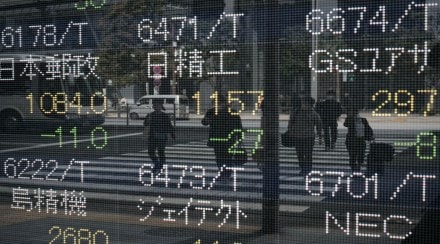Stocks slipped in Asia on Thursday and bonds were again on the back foot, weighed down by the impact of high inflation.
MSCI Inc.’s Asia-Pacific equity index declined as bourses in Japan, China and Hong Kong struggled for traction. A rally in Chinese tech shares fizzled.
US futures dipped after Wall Street snapped a two-day rally. A climb in oil past $122 a barrel has stoked worries about rising costs and monetary tightening.
Sentiment also took a knock after Shanghai said it will lock down a district on Saturday morning for mass Covid testing. That’s the city’s first major movement restriction since it exited curbs earlier this month.
Benchmark Treasury yields held above 3% and New Zealand’s 10-year yield touched the highest level in seven years. The dollar-yen pair is dominating foreign-exchange markets, with the weakness in Japan’s currency putting the 2002 high of 135.15 in play.
Markets remain fixated on the risk of a downturn triggered by interest-rate hikes across much of the world to quell price pressures.
The OECD added to the gloom with a warning that the global economy will pay a “hefty price” for Russia’s war in Ukraine in the form of weaker growth, stronger inflation and potentially long-lasting damage to supply chains.
“Our view is that the chance of recession by the end of 2023 is 40% or so,” Anna Han, equity strategist at Wells Fargo Securities LLC, said on Bloomberg Television. An “upward surprise” from the US consumer-price index release Friday could flatten the Treasury yield curve, she added.
ECB Rate Outlook
Meanwhile, the European Central Bank Thursday is set to wind down trillions of euros of asset purchases in a prelude to a rate hike expected in July that would cement a path toward exiting eight years of negative rates. The euro was little changed, while European equity futures retreated.
“Chances are that the ECB will have a hawkish pivot today,” Carol Kong, a strategist at Commonwealth Bank of Australia, said on Bloomberg Television. “If we do see Christine Lagarde leaning toward a 50 basis-points hike in July, that’s going to be very supportive of the euro-dollar.”
Trade data are due later in China. Shanghai’s reopening from a two-month long Covid lockdown may have provided a temporary boost: economists predict exports grew 8% year-on-year in May, up from 3.9% in April.
Stocks
- S&P 500 futures shed 0.3% as of 10:45 a.m. in Tokyo. The S&P 500 fell 1.1%
- Nasdaq 100 futures fell 0.4%. The Nasdaq 100 fell 0.8%
- Japan’s Topix index was flat
- Australia’s S&P ASX/200 index lost 1.3%
- South Korea’s Kospi index declined 0.6%
- Hong Kong’s Hang Seng index fell 0.1%
- China’s Shanghai Composite index declined 0.2%
- Euro Stoxx 50 futures fell 0.6%
Currencies
- The Bloomberg Dollar Spot Index rose 0.1%
- The euro was at $1.0712
- The Japanese yen was at 134.27 per dollar
- The offshore yuan was at 6.7029 per dollar
Bonds
- The yield on 10-year Treasuries advanced two basis points to 3.05%
- Australia’s 10-year yield increased four basis points to 3.59%
Commodities
- West Texas Intermediate crude was at $122.50 a barrel, up 0.3%
- Gold was at $1,852.68 an ounce
